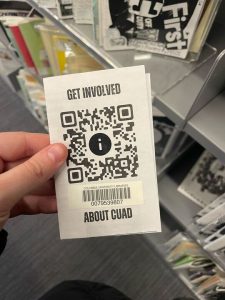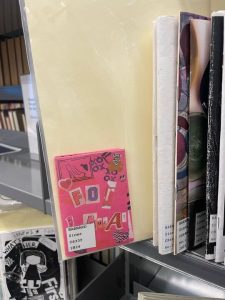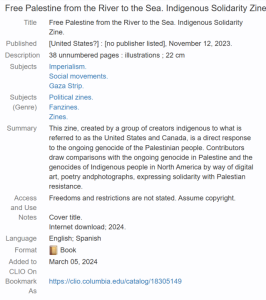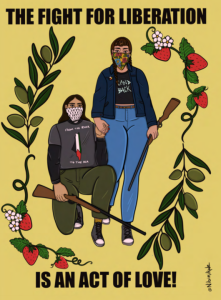Barnard College’s library shelves are stocked with anti-Israel pamphlets, including some from Columbia University Apartheid Divest (CUAD), the anti-Semitic student group behind last spring’s encampments. Others direct readers to content praising assassinated Hamas leaders like Yahya Sinwar and Ismail Haniyeh and justifying the Oct. 7 attack, the Washington Free Beacon has learned.
The pamphlets, known as “zines,” are listed on Columbia University’s online catalog, meaning they were officially incorporated into Barnard’s Milstein Library and not slipped onto the shelves by students. A Free Beacon review found a dozen anti-Israel publications—some of which are available online to students of Barnard and Columbia, its sister school—in the catalog of roughly 4,000 zines. The zine collection is overseen by several Barnard students and director Jenna Freedman, who has long pushed anti-Israel sentiments and helped form a group called Librarians and Archivists for Palestine.

The zines, which have not been previously reported, are yet another example of pervasive anti-Semitism at Barnard and Columbia. CUAD led a March 5 raid on Milstein Library, where the zines are housed. During the storming, the mob injured two security officials and distributed Hamas propaganda justifying the Oct. 7, 2023, terror attack.
Two of the anti-Israel pamphlets, both published by CUAD, were included in Milstein Library’s June 2024 exhibit of zines focused on recognizing “how we can be complicit in systems of oppression locally and abroad.” One of those pushed the anti-Semitic boycott, divestment, and sanctions movement and called on “KKKOLUMBIA” to defund its Public Safety office. It also quotes Popular Front for the Liberation of Palestine (PFLP) founder George Habash in calling Columbia a “bodyguard of U.S. imperialism,” and includes a sprawling flowchart connecting university leadership to military contractors, tech giants, Israel, and the New York City Police Department.
Barnard still shelves two copies of that zine, photos obtained by the Free Beacon confirm. At least one of those sports a sticker with a barcode and text that reads “COLUMBIA UNIVERSITY LIBRARIES.”



The other was stylized as a tween scrapbook—complete with a Barbie Band-aid and a keffiyeh-clad teddy bear waving a Palestinian flag—condemning Barnard president Laura Ann Rosenbury. It accused her of “weaponizing Jewish pain to support genocide” and called for a boycott of her February 2024 inauguration. CUAD lists the zine’s title as Barnard Burn Book, but the library exhibit sanitized the name to simply For Laura. A copy still remains on Barnard’s shelf, a photo obtained by the Free Beacon confirms.


Nearly two weeks after Rosenbury’s ceremony, the pamphlet was uploaded to the online catalog, making it accessible to Columbia and Barnard students and alumni.
Other titles in Barnard’s zine collection include Queers, Wake Up!, We Are All Gaza Free Palestine!, Occupation and (Medical) Apartheid in Palestine, and A Guide to Palestinian Solidarity Rallies.

Barnard describes its zines as self-published works that platform the experiences of marginalized communities. Yet the Free Beacon didn’t find any that pushed pro-Israel, pro-Zionist, or pro-Jewish messages, even as anti-Semitic incidents soared to 10,000 incidents—an unprecedented level—in the year following Hamas’s terrorist attack, according to the Anti-Defamation League.
In addition to the CUAD publications, Milstein Library also stocks an issue of the Indigenous Solidarity Zine, which was published roughly a month after Hamas’s Oct. 7 attack. The zine was “created by a group of creators indigenous to what is referred to as the United States and Canada” in “direct response to the ongoing genocide of the Palestinian people.”

The issue, Free Palestine from the River to the Sea, repeatedly puts quotation marks around mentions of Israel, downplaying the Jewish state’s legitimacy, and promises to “take up arms for self-defence and organize in every possible way” to eradicate colonial oppression. It also features a cartoon of two women holding long guns, one in a shirt that shows a Palestinian flag shaped like Israel, Gaza, and the West Bank, the other wearing a crop top that says “LAND BACK.” The caption reads, “THE FIGHT FOR LIBERATION IS AN ACT OF LOVE.”

The issue begins by encouraging readers to donate to various aid groups that have been tied to anti-Semitism, including the Hamas-tied United Nations Relief and Works Agency; the Palestine Children’s Relief Fund, which has partnered with Hamas-linked groups; the American subsidiary of Islamic Relief Worldwide, which the United States has accused of spreading anti-Semitism; and the U.S. Palestinian Community Network, whose national chairman said Israel “has no right to exist.”
Under the solicitations is a QR code captioned “Resource List,” which directs users to dozens of anti-Israel articles and documents, including some by figures like Habash, fellow PFLP member Ghassan Kanafani, and Bassel Al-Araj, who led a terrorist cell but was killed in a shootout with Israeli soldiers before he could carry out his planned attacks.
One document included was created a day after Hamas’s Oct. 7 assault and said “[t]his was not an ‘attack.’ It was a response.” It boasts that the attack gave Hamas “enough Israeli prisoners to free every single Palestinian hostage held by Israel.” Another defended the Second Intifada as “armed resistance.” During the five-year onslaught beginning in 2000, militants launched rocket attacks at civilians and suicide bombers targeted restaurants and public areas in Israel, killing around 1,000 Israelis.
The resource list also includes primers on Sinwar and Haniyeh that laud the assassinated Hamas leaders. One claims Sinwar, the Oct. 7 mastermind, “gained recognition for his sharp intellect and toughness” after he “extensively studied Israeli society and politics.” Another, titled “The Murder of Ismail Haniyeh,” calls Haniyeh “well-respected for his pragmatism and ability to work with rivals and opponents.”
A Barnard spokesman said the college’s zine collection “exists to support intellectual curiosity, creativity, scholarship, and teaching.”
“The College does not endorse the content of any individual zine, just as it does not endorse every book on the library’s shelves,” the spokesman added. “But the ability of students, faculty, and researchers to access materials, including those we may disagree with, or even find reprehensible, and to study them critically is fundamental to academic freedom and the mission of higher education itself.”
Yet the catalog exclusively centers on left-wing activism by nature. Zines in the college’s catalog are “created by women and transfeminine people, with a collection emphasis on zines by BIPOC women/transfeminine and by transwomen of all races and ethnicities,” its website notes. But “when we are understaffed, we prioritize materials by people underrepresented in our archives, so we may need to lovingly refer papers from non-BIPOC folx elsewhere.”
Beyond anti-Israel sentiments, the zines are focused on a range of far-left topics, including third wave feminism, gender, the queer community, the trans experience, anarchism, and “riot grrrl.”
Including pro-Hamas material in Barnard’s zine collection seems like a bizarre choice given the library’s selection process. The terror group is famously misogynistic, homophobic, and transphobic. According to the advocacy group Queers in Gaza, “living as a Queer person in Gaza is punishable by torture and death.”
“There is no transgender population in Gaza because any trans person who lives openly will be hunted down by Hamas,” it adds, noting that “Israel grants asylum rights to LGBT Palestinians who face death in Gaza and the Palestinian Territories.”
Columbia did not respond to a request for comment. The Free Beacon received an auto-response from Freedman noting that she was on vacation.
“Between dedicated cataloging days and taking vacation days that I’ll lose if I don’t, and the mental strain of working in the epicenter of the fall of academia in the US, I anticipate a slow response time between now and the end of the fiscal year,” (emphasis hers) her email read.

















